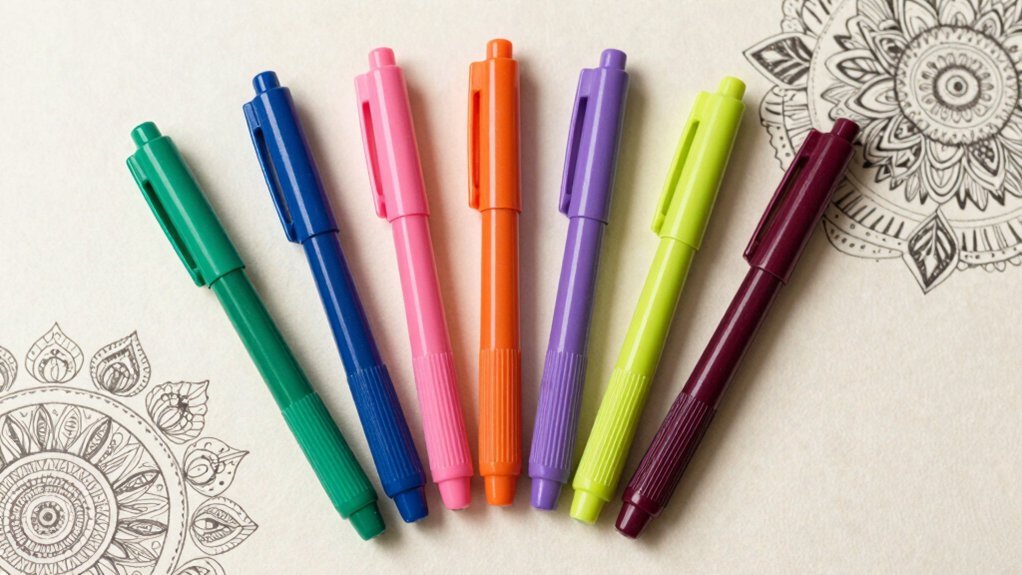Journaling helps ease generalized anxiety by offering a safe space for you to process your thoughts and emotions. It enhances self-awareness, allowing you to identify triggers and recognize patterns in your feelings. By writing down your worries, you lighten your emotional load and transform chaotic thoughts into something tangible. Regular journaling can also foster mindfulness, pulling you back to the present moment. Not only does it promote emotional release and clarity, but it also builds coping strategies over time. If you're curious about more ways to implement this practice effectively, there's plenty more to explore.
Understanding Generalized Anxiety

Generalized anxiety disorder (GAD) affects about 3% of the population, making it a common yet often misunderstood condition. If you've ever felt persistently anxious, you might relate to the overwhelming worry that seems to have no specific cause.
GAD often manifests as excessive anxiety about various aspects of life, from work to relationships, leading to a sense of impending doom. You may find it hard to control these worries, which can disrupt your daily activities and overall well-being.
Physical symptoms, like fatigue, muscle tension, and sleep disturbances, often accompany the mental strain. It's not just about feeling nervous; GAD can create a cycle of anxiety that leaves you feeling drained and overwhelmed.
You might notice that even minor decisions become monumental tasks, as your mind races with potential outcomes and worst-case scenarios.
Understanding that GAD is a recognized mental health condition can empower you to seek help. It's important to remember that you're not alone in this struggle. Many people experience similar feelings, and recognizing these symptoms is the first step toward finding effective strategies for managing anxiety.
The Role of Writing Therapy
Writing therapy can be a powerful tool for managing anxiety. It allows you to express your thoughts and feelings on paper, helping you process your emotions. You might find that writing brings clarity to chaotic thoughts, enabling you to identify triggers and patterns in your anxiety.
Here's a simple breakdown of how writing therapy works:
| Aspect | Explanation |
|---|---|
| Expression | Writing provides a safe space to express your feelings without judgment. |
| Reflection | It encourages self-reflection, helping you understand your anxiety better. |
| Release | Putting pen to paper can be cathartic, allowing you to release pent-up emotions. |
Benefits of Journaling

Journaling offers numerous benefits that can greatly alleviate anxiety. First, it provides an outlet for your thoughts and feelings, letting you express emotions that might otherwise stay bottled up. This process can help you gain clarity about what's troubling you, making it easier to understand your anxiety triggers.
Second, writing regularly can enhance your self-awareness. As you document your experiences, you'll start to notice patterns in your thoughts and behaviors. This insight allows you to identify and address potential issues before they escalate.
Additionally, journaling fosters mindfulness. When you take the time to write, you engage in the present moment, which helps you detach from overwhelming worries about the future or regrets from the past. This focus can create a sense of calm and stability.
Moreover, journaling serves as a powerful tool for problem-solving. By articulating your concerns on paper, you can brainstorm solutions and explore different perspectives, empowering you to take action rather than feeling stuck.
Lastly, it's a personalized experience. You can tailor your journaling practice to fit your needs, whether that means writing daily, weekly, or whenever anxiety strikes.
How Journaling Reduces Stress
Journaling offers an emotional release that helps you process your feelings and let go of stress.
By putting your thoughts on paper, you enhance your self-reflection, gaining clarity on what's bothering you.
This practice not only lightens your emotional load but also empowers you to manage anxiety more effectively.
Emotional Release Mechanism
The act of putting pen to paper can serve as a powerful emotional release mechanism, especially for those grappling with anxiety. When you write about your feelings, you take the chaos swirling in your mind and give it a tangible form. This process allows you to confront your emotions instead of bottling them up, reducing the weight they carry.
As you express your thoughts, you may find that the act of journaling helps to clarify what's really bothering you. You might discover patterns in your anxiety, identify triggers, and even articulate fears you didn't realize you had. This clarity often leads to a sense of relief, as naming your feelings can diminish their power over you.
Moreover, journaling provides a safe space to vent frustrations without judgment. You can let your emotions flow freely, whether you're feeling overwhelmed, angry, or sad. This unfiltered expression can be cathartic, releasing pent-up feelings and helping you feel lighter afterward.
Ultimately, by transforming internal turmoil into written words, you create a pathway for emotional healing and stress reduction. Engaging in this practice regularly can create a significant shift in how you manage anxiety.
Enhanced Self-Reflection Process
Harnessing the power of self-reflection through writing can greatly reduce stress. When you journal, you create a space to examine your thoughts and feelings more deeply. This process allows you to pinpoint stressors and understand your emotional responses to them. By articulating your worries on paper, you transform vague anxieties into concrete ideas, making them easier to manage.
As you engage in this reflection, you gain valuable insights about your patterns of thinking and behavior. You might discover triggers that lead to anxiety or recognize negative thought cycles that need to be challenged. Journaling acts as a mirror, reflecting your inner world and helping you see things from a different perspective.
Additionally, the act of writing can organize your thoughts, leading to greater clarity. You're not just venting; you're analyzing and strategizing ways to cope. This structured approach encourages problem-solving, empowering you to take actionable steps toward reducing your stress.
In essence, journaling fosters a deeper understanding of yourself, allowing you to navigate your emotions with increased confidence and resilience. It's a powerful tool in your mental health toolkit.
Expressive Writing Techniques

Expressive writing techniques offer a powerful way to process your feelings and reduce anxiety. By putting your thoughts onto paper, you create a space to explore emotions that may feel overwhelming.
Start by setting a timer for 10 to 15 minutes. Choose a prompt, like "What's been bothering me lately?" or "How do I feel about my current situation?" Write freely without worrying about grammar or punctuation. This isn't about perfection; it's about expression.
Another effective technique is to focus on a specific event or experience. Describe it in detail, capturing your emotions and reactions. This can help you gain clarity and distance from the situation, allowing for deeper insight.
You might also try writing letters that you don't send. Address them to someone who's impacted your feelings, or even to yourself. This allows you to voice your thoughts without the pressure of a response.
Lastly, consider using metaphors or imagery. This can help you articulate complex feelings more easily.
Creating a Safe Space
To truly benefit from journaling, you need to create a safe space where you feel comfortable expressing yourself.
Your physical environment plays a huge role in this process, as it should be a place where you can freely explore your thoughts and emotions.
Physical Environment Matters
Creating a safe space for journaling can greatly impact your experience, especially when dealing with anxiety. Your physical environment can either enhance or hinder your ability to express yourself freely. To optimize your journaling practice, consider factors like comfort, lighting, and noise levels.
| Element | Importance | Tips |
|---|---|---|
| Comfort | Reduces physical tension | Use a cozy chair or cushion |
| Lighting | Affects mood and focus | Choose soft, natural light |
| Noise Levels | Minimizes distractions | Consider white noise or silence |
Set up a spot that feels inviting and calming. This could be a corner of your room, a cozy nook, or even a favorite café. Make sure you have everything you need within reach—your journal, pens, or any other materials that help you feel at ease. By creating a nurturing environment, you can encourage relaxation and open up more easily, allowing your thoughts to flow. Remember, your journaling space should feel like a haven, where anxiety can't intrude.
Emotional Freedom Through Writing
Writing can be a powerful tool for finding emotional freedom, especially when you establish a safe space for yourself. Creating this environment allows you to express your thoughts and feelings without judgment.
It's crucial to find a place where you feel comfortable and secure, where your words can flow freely.
To help you cultivate this safe space, consider the following:
- Choose a quiet location: Find a spot that minimizes distractions and promotes focus.
- Set a routine: Establish a consistent time for writing to make it a regular part of your day.
- Create a personal ambiance: Use soft lighting, calming scents, or soothing music to enhance your writing experience.
- Limit interruptions: Turn off your phone or any notifications to immerse yourself fully in the process.
- Use prompts if needed: Sometimes, a guiding question or statement can help you dive deeper into your emotions.
Building Self-Awareness

Self-awareness serves as a powerful tool in managing anxiety, allowing you to recognize patterns in your thoughts and emotions. By journaling, you create a space to reflect on your daily experiences, helping you identify triggers and underlying feelings that contribute to your anxiety. As you write, notice recurring themes or thoughts that arise. This practice can illuminate how certain situations or interactions affect your mood and stress levels.
When you document your feelings, you'll start to understand how your responses evolve over time. Are you reacting to stressors in a consistent way? Are there specific thoughts that lead you to feel anxious? This clarity can empower you, as it helps you break free from automatic reactions.
Additionally, journaling promotes mindfulness, encouraging you to stay present with your thoughts. Instead of getting lost in your worries, you'll be actively engaging with them. This engagement fosters a deeper connection to your emotions, making it easier to understand yourself.
Over time, building self-awareness through journaling not only reduces anxiety but also enhances your overall emotional health, equipping you to face challenges with greater resilience.
Enhancing Emotional Regulation
Through the practice of journaling, you can greatly enhance your emotional regulation by providing a structured outlet for processing your feelings.
When you write down your thoughts, you create a safe space to explore your emotions without judgment. This process helps you identify triggers and patterns, making it easier to manage your reactions.
Journaling encourages you to:
- Reflect on emotional experiences, helping you understand their impact.
- Express feelings that might be hard to verbalize, reducing their intensity.
- Develop coping strategies by brainstorming solutions to emotional challenges.
- Track your emotional responses over time, revealing progress and areas for improvement.
- Cultivate mindfulness by focusing on your current feelings and thoughts.
Incorporating Journaling Into Daily Life

To make journaling a part of your daily life, start by establishing a routine that works for you.
Whether you prefer a simple notebook or a guided journal, choosing the right journal can enhance your experience.
Don't forget to use prompts for reflection to keep your thoughts focused and meaningful.
Establishing a Routine
Establishing a journaling routine is essential for managing anxiety effectively. When you make journaling a consistent part of your day, it becomes a reliable outlet for your thoughts and feelings.
To create a routine that works for you, consider the following tips:
- Choose a specific time: Set aside a dedicated time each day, whether it's in the morning, during lunch, or before bed.
- Find a comfortable space: Select a quiet, inviting spot where you can focus and reflect without distractions.
- Start small: Begin with just a few minutes each day. Gradually increase the time as you become more comfortable with the practice.
- Keep it simple: Don't overthink what you write. Focus on expressing your thoughts honestly without judgment.
- Be consistent: Aim to journal daily or several times a week. Consistency helps reinforce the habit and strengthens its impact on your anxiety.
Choosing a Journal
Choosing the right journal can greatly enhance your journaling experience and help you incorporate it seamlessly into your daily life. Start by considering what feels comfortable for you. Do you prefer a bound notebook, a spiral notebook, or even a digital app? Each option offers distinct advantages, so pick one that aligns with your lifestyle.
Next, think about the size of the journal. A compact one can easily fit in your bag, making it convenient for on-the-go writing. A larger journal might provide more space for your thoughts, but it may be less portable. Choose what suits your needs best.
Consider the journal's aesthetics as well. A visually appealing journal can inspire you to write more regularly. Whether you favor minimalistic designs or vibrant colors, find something that resonates with you.
Prompts for Reflection
Once you've selected the right journal, incorporating it into your daily life becomes key to managing anxiety.
Regularly using prompts can help you reflect on your thoughts and emotions, making journaling more effective.
Here are some prompts to get you started:
- What am I grateful for today, and why?
- What specific thoughts or situations triggered my anxiety this week?
- How did I cope with my anxiety today, and what worked best?
- What positive affirmations can I remind myself of when I feel anxious?
- What're three things I can do differently tomorrow to reduce my anxiety?
Success Stories and Testimonials
Many individuals have found relief from anxiety through the practice of journaling, sharing their inspiring experiences along the way. You might be surprised to hear how journaling has transformed lives, helping people manage their anxiety and gain clarity. Here are some testimonials that illustrate these success stories:
| Name | Experience | Outcome |
|---|---|---|
| Sarah | "I wrote down my worries daily." | Felt lighter and more focused. |
| David | "Journaling helped me confront my fears." | Gained confidence in social settings. |
| Emily | "I expressed my emotions freely, which was liberating." | Improved mental clarity and peace. |
| Mike | "Tracking my thoughts made me aware of patterns." | Reduced anxiety attacks considerably. |
| Jessica | "Each entry was a step toward understanding myself better." | Cultivated self-compassion and resilience. |
These stories show that journaling isn't just a writing exercise; it's a pathway to healing. If you're seeking a way to cope with anxiety, consider starting your own journaling journey. You might just find the relief you've been looking for.
Frequently Asked Questions
Can Journaling Replace Professional Therapy for Anxiety?
Journaling can't fully replace professional therapy for anxiety, but it complements it. It helps you process emotions, gain insights, and develop coping strategies. Consider using both for a more thorough approach to managing your anxiety.
How Long Should I Journal Each Day?
You should aim to journal for at least 10 to 20 minutes each day. It's enough time to reflect on your thoughts and feelings without feeling overwhelmed. Consistency matters more than duration in this practice.
What Type of Journal Is Best for Anxiety Relief?
For anxiety relief, a guided journal works wonders. It prompts you with questions and topics, helping you express feelings. Alternatively, a creative journal allows free expression through art or poetry, which can be incredibly therapeutic.
Is There a Specific Format for Journaling?
There's no strict format for journaling; it's all about what works for you. You can write freely, use prompts, or create lists. Experiment and find a style that feels comfortable and effective for you.
Can Journaling Worsen Anxiety for Some Individuals?
Yes, journaling can worsen anxiety for some people. If you focus too much on negative thoughts or feelings, it might intensify your emotions. It's important to find a balanced approach that works for you.
In Summary
Incorporating journaling into your daily routine can greatly ease generalized anxiety. By expressing your thoughts and feelings on paper, you'll build self-awareness and enhance emotional regulation. This simple yet powerful practice not only reduces stress but also fosters a therapeutic outlet for your emotions. So grab a notebook and start writing; you'll discover the transformative benefits of journaling for your mental well-being. Embrace this journey, and watch your anxiety diminish over time.





Leave a Reply